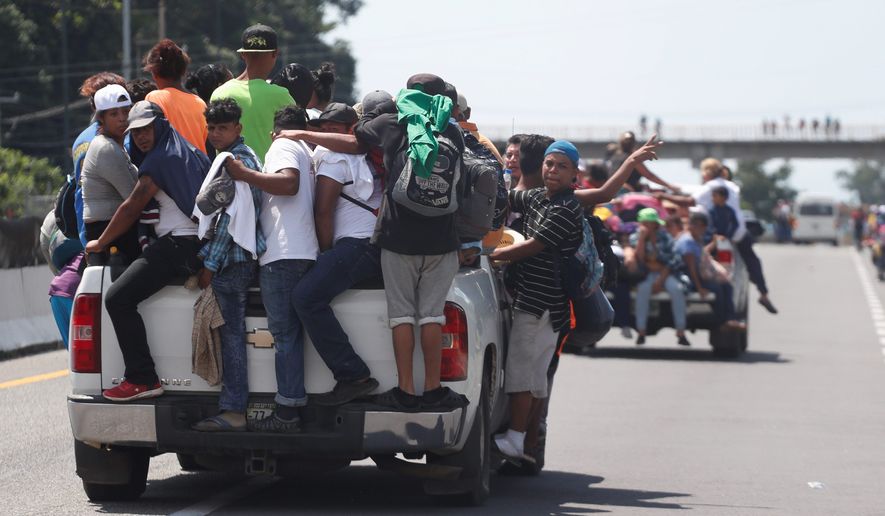The combined efforts of Mexico, Guatemala, Honduras and the U.S. were not enough to deter thousands of migrants who broke through barricades or swam into Mexico over the weekend, defying their home government’s calls for them to return and America’s warnings that their journey is futile.
Local leaders say hundreds of people who were part of the migrant caravan have given up their journey and are returning to their homes in Honduras and Guatemala. But perhaps 2,000 others entered Mexico illegally and vowed to cross that country, with the U.S. their goal.
Saying they weren’t content to wait for authorities to process and admit them in smaller groups, they overcame Mexican police who had been deployed to try to prevent the mass entry.
“We are going to reach the United States,” Erasmo Duarte, a migrant from Danli, Honduras, told The Associated Press. “We couldn’t wait because we had already waited too long and they only told us lies.”
Local news reports said once the migrants broke into Mexico, authorities there did not try to stop them. They left the migrants to prepare for the long journey across the country and to the U.S., where they plan to test the administration’s resolve.
President Trump on Sunday called the caravan a “disgrace” and blamed Democrats, federal courts and the migrants themselves.
SEE ALSO: Kirstjen Nielsen warns of cartels’ role in migrant caravan
“Full efforts are being made to stop the onslaught of illegal aliens from crossing our [southern] border,” he tweeted. “People have to apply for asylum in Mexico first, and if they fail to do that, the U.S. will turn them away. The courts are asking the U.S. to do things that are not doable!”
Earlier in the weekend, Mr. Trump told reporters that he would send the military — and not just the National Guard — to the border if need be.
That plan would create a number of legal entanglements, though the president’s suggestion of a military option served to underscore his frustration with the situation and the lack of tools the U.S. has to counter determined migrants willing to make the trip and prepared to demand asylum, whether deserving or not.
Mexican authorities have taken a firmer stand against this caravan than the one that traversed the country in the spring — partly at the urging of Mr. Trump, who threatened to cancel the trade deal he is planning with Mexico unless officials block entry.
The Mexican government said the migrants would have to apply for entry, and only those with passports would be granted travel permission. Others who had a case for asylum would be allowed to make it.
Those restrictions were too onerous for many migrants, for whom Mexico is a hurdle to be surmounted as they reach for their real goal of taking jobs in the U.S. or reuniting with family already in the country — usually illegally.
The caravan began in San Pedro Sula, a Honduran city known as one of the most violent places in the world. It grew steadily as it made its way through Honduras and Guatemala to as many as 5,000 people by some estimates.
Caravan members say they are fleeing gang violence at home and looking for jobs in the U.S. — neither of which has traditionally been enough reason to win asylum on its own.
But thanks to court rulings and generous U.S. laws, it’s easy to make an unworthy claim, and migrants making those claims are usually released into the interior of the U.S., where they disappear into the shadows with an estimated 11 million other illegal immigrants.
Mr. Trump has been complaining about that situation for months. His administration has suggested several changes, including holding illegal immigrants until they can be deported and allowing bogus asylum claims to be denied at a quicker pace.
Those proposals have not gotten traction among congressional Democrats, who view those changes as anti-immigrant.
Migration is just as controversial in Mexico, where President-elect Andres Manuel Lopez Obrador said he will ask Mr. Trump to pony up more money to try to build Central American society and create jobs in Mexico, hoping to stem the flow of people to the U.S.
He said the migrants’ rights must be protected as they break into Mexico and head north.
Amnesty International also called on Latin American governments to let people enter and apply for protections.
“The Mexican government should put the human rights of the caravan members at the heart of the response and not let the U.S. Trump administration’s pressure prevent it from fulfilling its international obligations,” said Erika Guevara-Rosas, the organization’s director for the region.
Homeland Security Secretary Kirstjen Nielsen warned Sunday that the illegal immigrant caravan could be exploited by the cartels that control most of the illegal flow of people through Latin America.
The ease of entering the U.S. is a selling point for the cartels, which control the drug and human smuggling routes and require payment of a “mafia fee” just to cross the U.S.-Mexico boundary line.
Court records show that fee typically runs from $1,000 to $2,000. That doesn’t include thousands of dollars in other fees that cover foot guides, drivers, stash houses and the rest of the illegal journey.
“While we closely monitor the caravan crisis, we must remain mindful of the transnational criminal organizations and other criminals that prey on the vulnerabilities of those undertaking the irregular migration journey,” Ms. Nielsen said in a statement Sunday.
She repeated U.S. backing for the governments that have tried to stem the flow.
“We fully support the efforts of Guatemala, Honduras and Mexico, as they seek to address this critical situation and ensure a safer and more secure region,” the secretary said.
• Stephen Dinan can be reached at sdinan@washingtontimes.com.




Please read our comment policy before commenting.